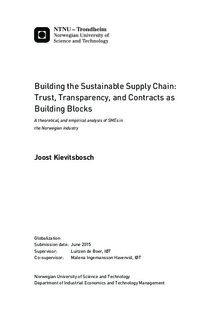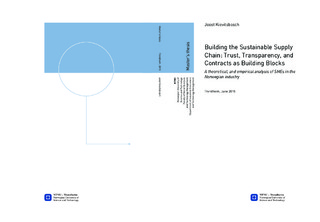| dc.description.abstract | This thesis aims to explain and discuss how trust, transparency, and contracts (TTC) are conceptually related to sustainability and how TTC influence and drive the sustainable supply chain. The scope of this research, in addition to a theoretical part, also includes an empirical analysis of SMEs in the Norwegian region of Møre og Romsdal by means of a survey. In the empirical part of the thesis, the extent to what indications for the relationship between trust, transparency, contracts and the sustainable supply chain are visible in the Norwegian industry is studied.
The research question that is answered in this study is as follows:
How are trust, transparency, and contracts conceptually related to sustainable supply chains and to what extent are indications for the relationship between trust, transparency, contracts and the sustainable supply chain visible in the practice of Norwegian companies?
The literature study in this thesis reveals that the concepts of trust, transparency, and contracts are highly interrelated and play an important role in sustainability practices. Resulting from the literature study it is identified that, first, it seems that TTC and sustainability have a high degree of shared aspects and therefore TTC is identified in as a driver and facilitator of sustainable relationships. Second, sustainable relationships are identified as a precondition for successfully implementing sustainability practices throughout the entire supply chain in order to establish a sustainable supply chain.
The survey used for this study has been sent to 72 SMEs in the region Møre og Romsdal in Norway, 11 companies responded resulting in a response rate of 15%. Analysis of the sample s results give some interesting indications regarding sustainability and the extent to what the relationship between TTC and sustainable supply chain is visible among the respondents. First, the respondents seem mainly to engage in internal practices related to environmental and social sustainability. Second, the respondents seem to have a high degree of trust based relationships compared to the degree that contract based relationships are used. Finally, there seems to be a visible relationships between TTC and the sustainable supply chain at the companies in Møre og Romsdal. However, this is limited to the use of a high degree of close collaboration relationships based on trust, and based on the awareness of almost all respondents that sustainability should be considered on a regular basis as theme for innovation and development. The resulting picture indicates that the Norwegian companies are at the stage of making their own organization environmentally and socially sustainable, and seem not to be at the point where environmental and social sustainability practices are carried out in cooperation with their customers and suppliers.
This thesis is a contribution to both the SISVI project as well as to the field of sustainability and supply chain research. In addition to contributing to an interesting project and fields, the results and propositions give indications for further research in the SISVI project. | |

